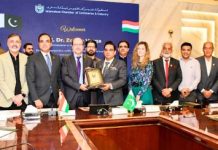ISLAMABAD: Nov 05 (DNA):Anti-microbial resistance (AMR) poses a significant threat to global health, and Pakistan is taking steps to address this growing crisis.
The National Institute of Health (NIH) recently convened a multi-stakeholder meeting to finalize a revised National Action Plan on AMR. AMR is a global health emergency that can lead to serious infections and increased mortality rates.
It is particularly concerning in low- and middle-income countries like Pakistan, where it can undermine efforts to achieve Sustainable Development Goals.
The revised action plan aims to strengthen surveillance systems, promote the responsible use of antibiotics, and improve infection prevention and control measures.
Key stakeholders, including government officials, healthcare providers, and civil society organizations, will collaborate to implement the plan.
On this occasion, Malik Mukhtar Ahmad Barath, Coordinator to the Prime Minister for Health, emphasized the importance of effective governance and coordination to combat AMR.
He highlighted the need for integrated health systems to ensure optimal antibiotic use and improve public health outcomes.
He stressed the importance of multi-sectoral collaboration to address AMR. He called for stronger coordination among various ministries and stakeholders to develop a comprehensive and effective response.
He also highlighted that Government has taken some concrete steps in order to establish a governance mechanism, a National Multi-sectoral AMR Steering Committee has been notified to ensure inter-sectoral information sharing and multi-sectoral coordination.
In addition, AMR secretariat has been established at NIH to coordinate and implement National Action Plan for AMR. Dr. Muhammad Salman, CEO of NIH, underscored the need to integrate AMR into national One Health policies.
He advocated for increased investment in surveillance systems to monitor resistance trends and inform public health interventions.
By implementing the revised National Action Plan on AMR, Pakistan aims to protect public health, reduce the burden of AMR-related infections, and contribute to global efforts to combat this pressing health challenge.

















